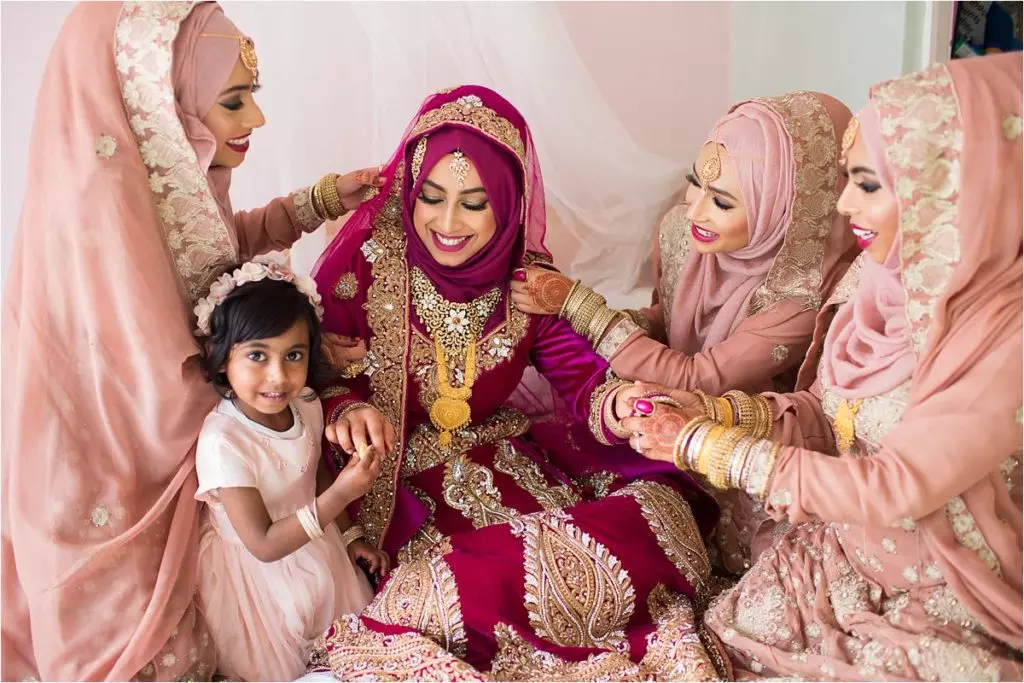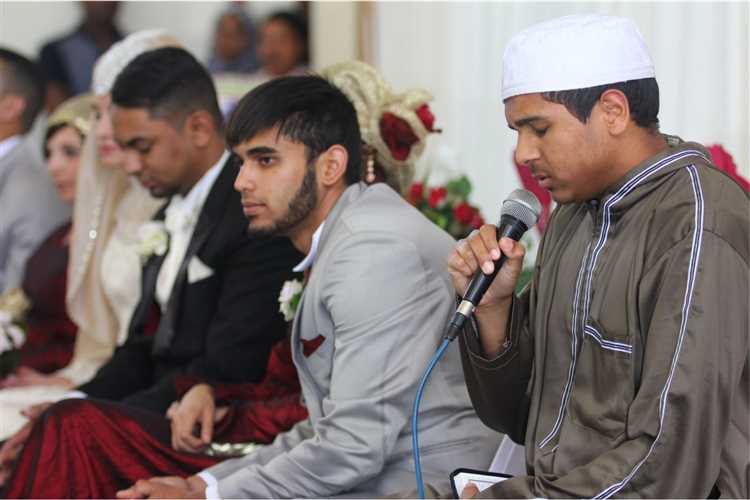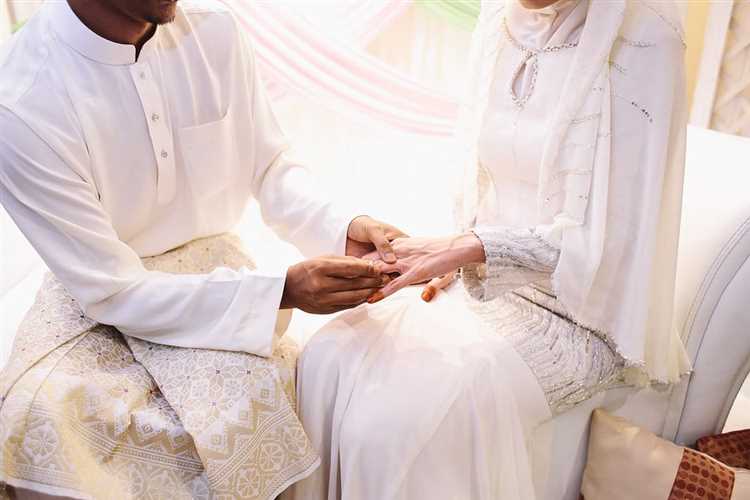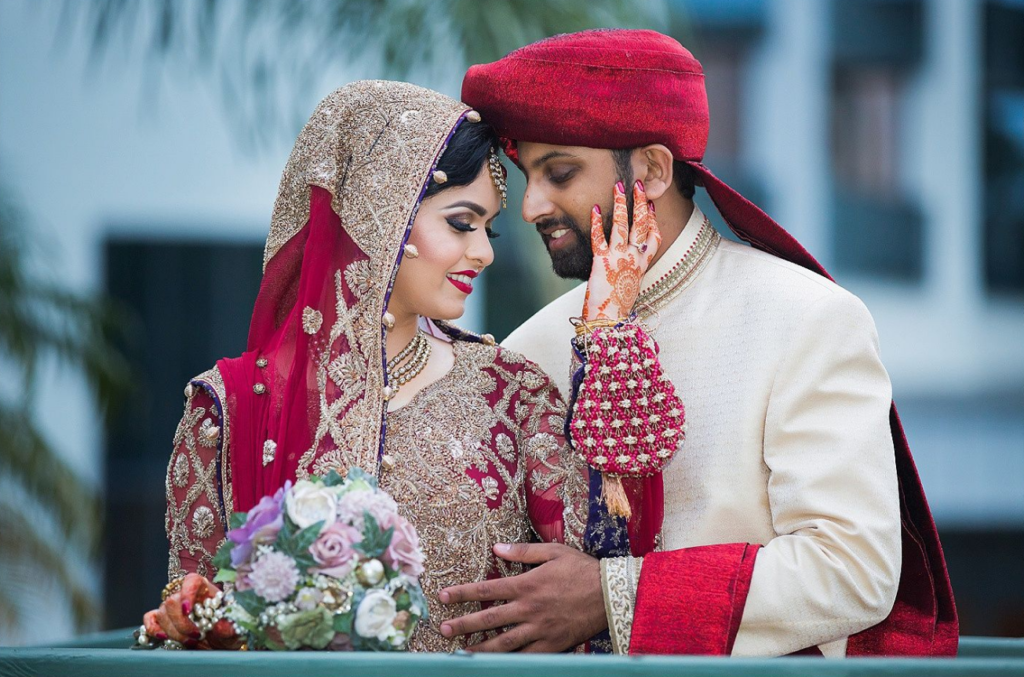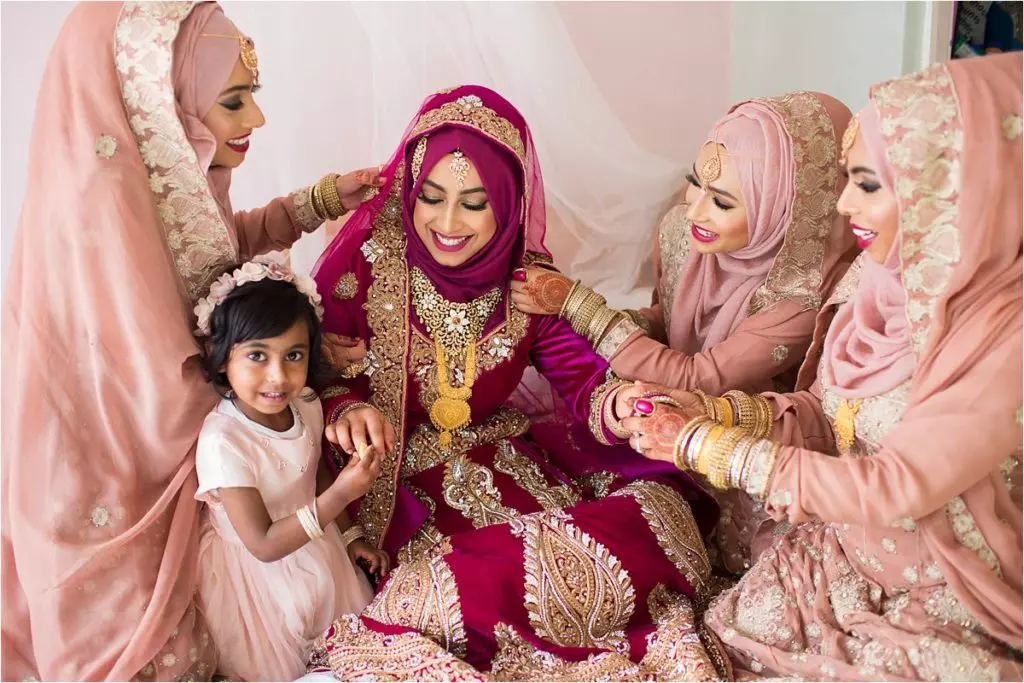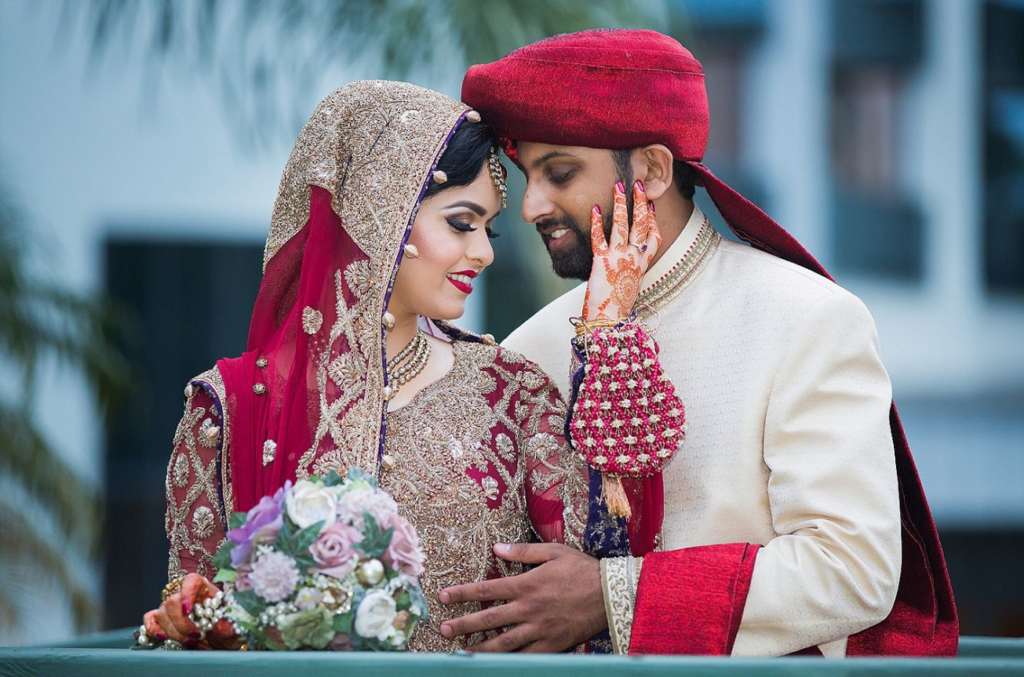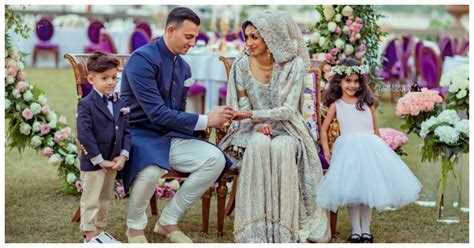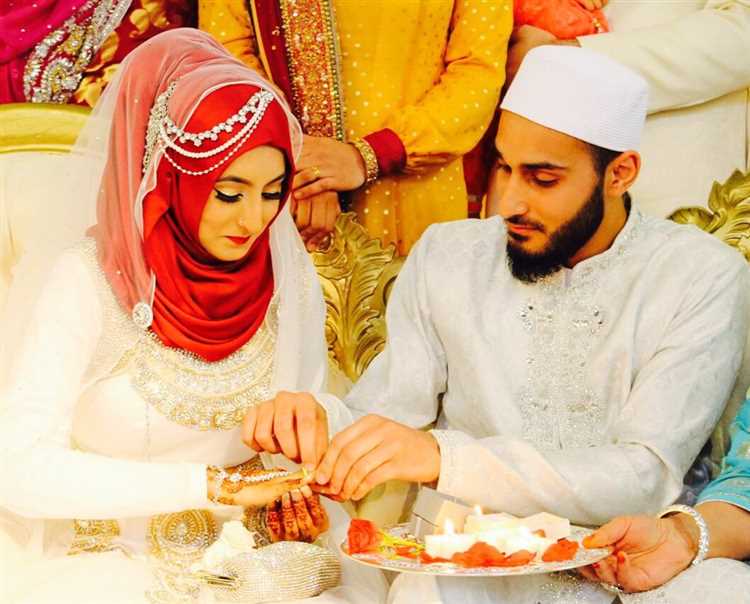Planning a wedding can be an exciting and joyful experience, but it can also be overwhelming and stressful. For Muslim couples, planning an Islamic wedding involves considering certain religious and cultural customs and traditions. This comprehensive guide aims to provide you with the information you need to plan and have an Islamic wedding that is both meaningful and memorable.
Understanding Islamic Wedding Customs
Islamic weddings are rooted in the teachings of Islam and are a sacred union between a man and a woman. It is important to familiarize yourself with the customs and rituals that are typically followed in an Islamic wedding. These may vary depending on cultural and regional differences, but they are generally based on Islamic principles.
“Mahr”, the bride’s dowry, is an essential aspect of an Islamic wedding. It is a gift that the groom gives to the bride as a sign of his love, respect, and commitment. The “Nikah” is the official marriage contract, which includes the consent of both the bride and the groom, along with the conditions of the marriage. The “Walima” is a wedding reception hosted by the groom’s family, where family and friends come together to celebrate the union.
It is important to remember that Islamic weddings prioritize simplicity and modesty. This means that extravagant displays of wealth or excessive traditions are discouraged. Instead, the focus is on fostering love, respect, and unity between the couple and their families.
Planning the Islamic Wedding
When planning an Islamic wedding, it is important to involve both families in the decision-making process. This helps to ensure that the customs and traditions are respected and followed. Start by setting a budget and creating a guest list. Discuss with your families the type of ceremony and reception you would like to have, taking into consideration any cultural or regional customs.
Find an imam or a religious leader who can officiate the wedding and guide you through the process. They can help you understand the requirements of an Islamic wedding and provide spiritual guidance. Don’t forget to obtain the necessary legal documentation, such as a marriage license, to ensure that your marriage is legally recognized.
“Halal” or permissible food is an important consideration for the wedding reception. Ensure that the food is prepared in accordance with Islamic dietary laws and that there are vegetarian and non-alcoholic options available for guests.
Conclusion
Planning an Islamic wedding involves not only organizing a beautiful ceremony and reception but also honoring and following religious traditions. By understanding and incorporating the customs and rituals of Islamic weddings, couples can create a meaningful and joyous celebration that reflects their faith and values. This comprehensive guide aims to provide you with the information you need to plan and have an Islamic wedding that is both true to your beliefs and a memorable experience for you and your loved ones.
Step-by-Step Guide for Planning an Islamic Wedding
1. Determine the Wedding Date:
- Select a suitable date for the wedding based on Islamic calendar or consult with a religious scholar.
- Consider the availability of the bride and groom, as well as their families.
2. Set a Budget:
- Determine a realistic budget for the wedding.
- Consider the number of guests, venue, food, decorations, and other necessary expenses.
3. Choose a Venue:
- Select a venue that can accommodate the number of guests.
- Ensure that the venue is appropriate for an Islamic wedding and that it provides separate spaces for men and women.
4. Create a Guest List:
- Decide on the number of guests to be invited.
- Include close family members, friends, and community members.
5. Hire Wedding Professionals:
- Consult with a wedding planner to help with the overall coordination of the event.
- Hire a photographer and videographer to capture the precious moments of the wedding.
6. Plan the Ceremony:
- Consult with an Imam or religious scholar to determine the specific requirements and rituals for an Islamic wedding ceremony.
- Decide on the order of events, such as recitation of Quranic verses, exchange of vows, and signing of the marriage contract.
7. Arrange for Pre-wedding Rituals:
- Coordinate with the bride’s family to plan the engagement ceremony, henna party, and other pre-wedding rituals.
- Ensure that these rituals follow Islamic traditions and customs.
8. Finalize the Menu:
- Select a halal caterer that can provide a diverse menu for the guests while adhering to Islamic dietary restrictions.
- Consider the preferences of the couple and their families when choosing the dishes.
9. Decide on Decorations:
- Choose appropriate decorations that reflect Islamic aesthetics and traditions.
- Incorporate elements such as flowers, lanterns, and Islamic art into the wedding decor.
10. Plan the Wedding Attire:
- Select modest and appropriate wedding attire for the bride, groom, and wedding party.
- Consider cultural and personal preferences when choosing the outfits.
11. Send Invitations:
- Design and send out invitations to the guests.
- Include all necessary details such as the date, time, venue, and dress code.
12. Prepare Wedding Favors:
- Create thoughtful and meaningful wedding favors for the guests.
- Consider Islamic-themed favors such as mini Qurans or prayer beads.
13. Plan the Post-wedding Celebrations:
- Organize a reception or Walima to celebrate the marriage.
- Consider the size of the event and the preferences of the couple and their families.
14. Coordinate with Vendors:
- Keep in touch with all the wedding vendors to ensure that everything is on track.
- Confirm arrangements, contracts, and payments.
15. Prepare for the Marriage Contract:
- Meet with a religious authority to draft and sign the marriage contract.
- Ensure that all legal and religious requirements are fulfilled.
16. Have a Rehearsal:
- Arrange a rehearsal to familiarize the wedding party with the ceremony order and any specific rituals.
- Practice the entrances and exits, as well as any readings or performances.
17. Enjoy Your Wedding Day:
- Relax and enjoy the wedding day, knowing that all the planning and preparation has been done.
- Focus on the love and commitment you are making to your partner.
18. Follow Up:
- Send thank-you notes to all the guests and vendors who helped make your wedding special.
- Reflect on the experience and consider sharing your wedding journey with others.
Remember, planning an Islamic wedding involves not only the logistics but also incorporating the values and teachings of Islam into every aspect of the celebration. By following this step-by-step guide, you can ensure a beautiful and meaningful wedding that aligns with your faith and brings joy to you and your loved ones.
Choosing the Right Venue for Your Islamic Wedding
When planning your Islamic wedding, one of the most important decisions you will make is choosing the right venue. The venue sets the tone for the entire event and plays a major role in creating a memorable experience for you and your guests. Here are some key factors to consider when selecting a venue for your Islamic wedding:
- Capacity: Start by determining the number of guests you expect to invite. Choose a venue that can comfortably accommodate all your guests, ensuring they have enough space to move around and enjoy the celebration.
- Location: Consider the location of the venue and its accessibility for your guests. Look for a central location that is convenient for everyone to reach. Additionally, ensure there is ample parking available to accommodate your guests.
- Ambience: Evaluate the ambience and décor of the venue. Does it align with the theme and style you have in mind for your wedding? Consider whether the venue can be easily decorated to match your vision and enhance the overall atmosphere.
- Islamic Considerations: As an Islamic wedding, it is essential to ensure the venue meets the religious requirements. Ensure there is a separate space for prayer, preferably with appropriate ablution facilities. Additionally, check if the venue allows for the separation of genders during the ceremony and reception.
- Services: Inquire about the services provided by the venue. Do they offer catering? Is there a dedicated wedding planner or coordinator who can assist you throughout the planning process? Consider whether the venue provides any additional services that can make your wedding planning easier.
- Cost: Set a budget for your wedding venue and look for options that fall within your allocated funds. Inquire about the venue’s pricing structure, including any additional fees or charges. Ensure you have a clear understanding of what is included in the package and what additional expenses you may incur.
Once you have considered all these factors, create a shortlist of potential venues that meet your criteria. It is always advisable to visit the venues in person and discuss your requirements with the venue management. Finally, make an informed decision based on your needs, preferences, and budget. Remember, the right venue can make your Islamic wedding a truly memorable and joyous occasion.
Essential Preparations for an Islamic Wedding
Planning an Islamic wedding requires careful preparations to ensure that the ceremony adheres to the principles and traditions of Islam. Here are some essential steps to consider:
- Discuss with Family: Start by discussing your plans with your immediate family and close relatives. Getting their blessings and involvement in the process will help create a harmonious atmosphere.
- Set a Budget: Determine your wedding budget and allocate funds for different aspects such as the venue, catering, decorations, and attire. Stick to the budget to avoid overspending.
- Select a Suitable Venue: Choose a venue that can accommodate the number of guests you plan to invite. Ensure that the venue aligns with Islamic principles, such as having separate spaces for men and women during the ceremony.
- Plan the Guest List: Prepare a list of guests you wish to invite to your wedding. Ensure that the list includes close family members, friends, and members of the community who are important to you.
- Choosing an Imam: Find a reputable and knowledgeable imam who can officiate the wedding ceremony according to Islamic traditions. Consult with your local religious community or mosque to find a suitable imam.
- Sending Invitations: Create and send out invitations to your guests, inviting them to join you on your special day. Consider including verses from the Quran or Islamic motifs in the design.
- Pre-Marital Counseling: Participate in pre-marital counseling sessions to gain insight into the responsibilities and expectations of married life. This can help strengthen your relationship and prepare you for the journey ahead.
- Arrange for Halal Catering: Ensure that the catering services you choose provide strictly halal food. Discuss your preferences and menu options with the caterers to ensure that the food aligns with Islamic dietary guidelines.
- Choose Appropriate Attire: Select modest and appropriate attire for the wedding ceremony, paying attention to the guidelines set by Islamic customs. Traditional Islamic attire such as a hijab or modest dress for women and a thobe or suit for men are commonly chosen.
- Decorations: Decorate the wedding venue with elegant and tasteful decorations that do not violate Islamic principles. Opt for modest and simple floral arrangements, Islamic calligraphy, or other culturally significant elements.
- Create a Wedding Schedule: Plan a detailed schedule for your wedding day, including the timing of the ceremony, reception, and any other events. This will help ensure that everything runs smoothly and according to plan.
- Islamic Marriage Contract (Nikah): Consult with your imam or religious authority to ensure that the marriage contract (nikah) is handled in accordance with Islamic customs. Have the necessary paperwork prepared beforehand.
- Photography and Videography: Hire a professional photographer and videographer to capture the memorable moments of your wedding day. Make sure they understand and respect the Islamic guidelines regarding modesty and privacy.
- Prepare for Post-Wedding Rituals: Consider the traditional rituals that may follow the wedding ceremony, such as walima (a reception hosted by the groom’s family). Plan and prepare for such events in advance.
By following these essential preparations, you can ensure that your Islamic wedding is a joyous and meaningful occasion in accordance with Islamic customs and traditions.
Islamic Wedding Attire: What to Wear and Why
When it comes to an Islamic wedding, the attire holds a significant importance for both the bride and the groom. Islamic wedding attire is not only about dressing modestly, but it also reflects the cultural traditions and religious values. Here are the key elements of Islamic wedding attire and the reasons behind them.
For the Bride:
- Hijab: The hijab, or head covering, is a mandatory part of the Islamic dress code for women. In an Islamic wedding, the bride typically wears a beautiful hijab to cover her hair and neck. This symbolizes the modesty and purity of the bride.
- Abaya: The abaya is a loose-fitting and floor-length gown that covers the entire body of the bride. It can be intricately embroidered or decorated, depending on the preferences of the bride. The abaya represents elegance, modesty, and femininity.
- Henna: Applying henna on hands and feet is a common practice in Islamic weddings. The intricate designs symbolize blessings, beauty, and good luck. The henna designs are often visible on the hands of the bride, adding to her overall appearance.
For the Groom:
- Thobe: The groom traditionally wears a thobe, which is a long white or light-colored garment that covers the entire body. It is a simple yet elegant attire that symbolizes purity and simplicity.
- Sunnah Cap: The groom often wears a sunnah cap, also known as a kufi or taqiyah, on his head. This cap is a symbol of modesty and adherence to the traditions of the Prophet Muhammad (peace be upon him).
- Sherwani: In some Islamic cultures, the groom may choose to wear a sherwani, which is a traditional embroidered coat-like garment. The sherwani adds a touch of grandeur and elegance to the groom’s attire.
It’s important to note that Islamic wedding attire varies across different cultures and regions. While the above elements represent the general guidelines, the specific choices may differ based on personal preferences and cultural customs. Ultimately, the attire should reflect the couple’s adherence to Islamic values while embracing their unique cultural heritage.
Understanding the Islamic Wedding Ceremony
The Islamic wedding ceremony, also known as Nikah, is a sacred and joyous event that celebrates the union of two individuals in the presence of Allah. It is an important milestone in the lives of Muslims and holds a special significance in Islamic culture.
The Intentions
Before the wedding ceremony begins, it is essential for both the bride and groom to have clear intentions and a proper understanding of marriage in Islam. They should enter into this sacred bond with the intention of building a strong and righteous family and seeking Allah’s blessings in their relationship.
The Marriage Contract
The marriage contract, also known as the Nikahnama, is a vital aspect of the Islamic wedding ceremony. It is a legal document that outlines the rights and responsibilities of both the bride and groom, as well as the terms and conditions of the marriage. The contract must be agreed upon by both parties and signed in the presence of witnesses.
The Mehr
Mehr, which is an important Islamic concept, refers to the bridal gift or dowry that the groom gives to the bride. It is a symbol of his commitment and financial responsibility towards his wife. The amount of Mehr is determined by mutual agreement and is often specified in the marriage contract.
The Arrangement
The Islamic wedding ceremony is usually conducted in a mosque or at the home of the bride’s family. It is important to create a suitable and respectful environment for the ceremony. The seating arrangement for guests should be segregated by gender, with separate areas for men and women.
The Sermon
The marriage ceremony begins with a sermon, which is delivered by the Imam or the person officiating the ceremony. The sermon typically covers various aspects of marriage in Islam, including the importance of love, understanding, and mutual respect between spouses.
The Recitation of Verses
After the sermon, selected verses from the Quran, such as Surah Ar-Rum (Chapter 30, Verse 21), are recited to remind the couple of the importance of faith and seeking Allah’s guidance in their marriage.
The Proposal and Acceptance
The groom’s representative, often his father or an elder relative, formally proposes to the bride on his behalf. The bride’s guardian, usually her father, accepts the proposal on her behalf. This step signifies the consent and agreement of both parties to enter into the marriage.
The Duas (Supplications)
Prayers and supplications play a significant role in the Islamic wedding ceremony. The couple, as well as their families and the gathered community, offer prayers for the success and happiness of the marriage.
The Marriage Blessings
The marriage ceremony concludes with the Imam or the person officiating the ceremony offering blessings and well-wishes to the couple. This is a moment of celebration and joy as the union is blessed by Allah.
As Muslims, it is important to approach the wedding ceremony with sincerity, love, and devotion to Allah. By understanding and embracing the Islamic teachings, couples can strengthen their bond and create a happy and fulfilling marriage.
The Role of Family and Community in an Islamic Wedding
In Islamic culture, the wedding ceremony is not just a union between two individuals, but also a celebration that involves the entire family and community. The support and involvement of family and friends are vital in making the event meaningful and memorable.
1. Arranged Marriages:
In some Islamic cultures, marriages are still arranged by the parents or close family members. This tradition ensures that the families are involved from the very beginning, ensuring compatibility and agreement between both families. The role of the family in an arranged marriage extends to planning and organizing the wedding ceremony.
2. Support and Guidance:
Throughout the wedding planning process, the family plays a crucial role in providing support and guidance to the couple. They can help with logistical arrangements, such as finding a suitable venue, managing the guest list, and arranging transportation. The family also offers emotional support, ensuring that the couple feels loved and supported during this important milestone.
3. Financial Contributions:
In many cases, the family and community members contribute financially towards the wedding expenses. This can involve covering the costs of the venue, catering, decorations, and other aspects of the ceremony. The financial support from the family helps alleviate the burden on the couple and allows them to focus on other aspects of the wedding planning process.
4. Cultural Traditions:
Families and communities also contribute to the wedding by incorporating cultural traditions and customs. This can include traditional dances, music, and attire. The involvement of the family in preserving these traditions ensures that the wedding remains a reflection of the couple’s cultural heritage.
5. Guest Involvement:
The role of the family and community extends beyond the planning and organization of the wedding. They also play a crucial role in ensuring the smooth running of the event itself. Family members and friends may take on roles such as greeters, ushers, or even performers during the ceremony. Their active involvement adds a personal touch and makes the wedding a truly communal celebration.
Conclusion:
In an Islamic wedding, the involvement of family and community members is crucial. From arranging the marriage to providing support, guidance, and financial contributions, the family plays an integral role in making the wedding a special and memorable event. Their involvement ensures that the couple feels supported and loved throughout the process, and that the wedding remains a reflection of their cultural heritage and values.
Islamic Wedding Traditions and Customs Explained
An Islamic wedding, also known as Nikah, is a sacred and joyous occasion that follows various traditions and customs. Here is an explanation of some of the key Islamic wedding traditions:
- Mahr: The mahr is a mandatory gift or dowry given by the groom to the bride. It is a symbol of the groom’s commitment and helps provide financial security for the bride.
- Wali: The wali is a male guardian of the bride who acts on her behalf during the marriage contract negotiations and ceremony. The wali can be the bride’s father, brother, or another close male relative.
- Marriage Contract: The marriage contract, known as the “aqd,” is a legally binding agreement between the bride and groom. It outlines the rights and responsibilities of both parties and can include specific conditions or provisions.
- Mahram: A mahram is a male relative whom the bride is prohibited from marrying due to blood ties or close family relationships. The presence of a mahram is required during certain parts of the wedding ceremony.
- Wedding Attire: Brides often wear traditional Islamic wedding dresses, which can vary depending on the cultural background of the couple. Modesty is an essential aspect of Islamic wedding attire, with many brides opting for long sleeves and veils.
During the Islamic wedding ceremony, the following customs are typically observed:
- The ceremony begins with the recitation of Quranic verses, followed by a sermon or a brief speech emphasizing the importance of marriage in Islam.
- The marriage contract is read aloud, and the bride and groom accept the terms and conditions of the contract in the presence of witnesses.
- The mahr is presented by the groom to the bride or her wali.
- The bride and groom may exchange rings or other symbolic gifts to signify their commitment and love.
- The couple’s union is solemnized by the recitation of prayers, blessings, and supplications by an Imam or religious officiant.
After the ceremony, it is customary for the newlywed couple to host a reception for family and friends. The reception may include traditional Islamic foods, music, and dancing to celebrate the joyous occasion.
It is important to note that Islamic wedding traditions and customs may vary across different cultures and regions. However, the core principles of love, commitment, and the significance of the marriage contract remain central to all Islamic weddings.
A Guide to Islamic Wedding Invitations and Guest List
When planning an Islamic wedding, it is important to consider the invitations and the guest list. Here is a comprehensive guide to help you with this aspect of your wedding:
1. Choose Islamic Wedding Invitation Designs
Select a wedding invitation design that reflects Islamic traditions and aesthetics. Choose from elegant calligraphy, intricate geometric patterns, or floral motifs. Islamic wedding invitations often feature verses from the Quran or the Bismillah (In the name of Allah) at the beginning.
2. Include Essential Information
The wedding invitation should include essential information such as:
- Date and time of the wedding
- Names of the bride and groom
- Location and address of the wedding venue
- Contact details for RSVP
3. Islamic Wedding Invitation Wording
When it comes to wording the invitation, it is essential to use appropriate Islamic terminology. Begin with “Bismillah” (In the name of Allah) and include blessings and prayers for the couple. You can also include verses from the Quran that are related to marriage.
4. Separate Invitations for Men and Women
In Islamic culture, there is often segregation between genders during wedding ceremonies. Consider sending separate invitations for the men and women attending the wedding. This will help in planning the seating arrangements and other logistics.
5. Preparing the Guest List
Prepare a guest list that includes close family members, friends, and members of the community. It is important to consider the size of the venue and your budget while finalizing the guest list. Make sure to consult with your families and prioritize those who are close to you.
6. Consider Cultural and Religious Sensitivities
When creating the guest list, keep cultural and religious sensitivities in mind. Ensure that the invitations are extended to individuals who will appreciate and respect the Islamic traditions and values. It is also important to be mindful of any dietary restrictions or accommodations needed for guests.
7. Sending Wedding Invitations
Send out your wedding invitations well in advance, preferably 4-6 weeks before the wedding date. This will give your guests enough time to RSVP and make necessary arrangements. You can use online platforms or traditional mail for sending out the invitations.
8. Personalize Your Invitations
Add a personal touch to your wedding invitations by including handwritten notes or personalized messages. This will show your loved ones that you appreciate their presence on your special day.
9. Keep Track of RSVPs
As the RSVPs start coming in, keep track of the number of guests attending. This will help you with finalizing the seating arrangements, catering, and other logistical details of your wedding.
10. Thank You Notes
After the wedding, send thank you notes to your guests to express your gratitude for their presence and blessings. This gesture shows appreciation and strengthens your bond with family and friends.
By following this guide, you can ensure that your Islamic wedding invitations and guest list are well-planned and in line with Islamic traditions. May your wedding be a blessed and joyous occasion for you and your loved ones!
Islamic Wedding Decorations: Creating a Memorable Ambience
When planning an Islamic wedding, one of the key elements that can create a memorable ambience is the choice of decorations. Islamic wedding decorations often reflect the rich cultural heritage and traditional aesthetics of the bride and groom. Here are some tips and ideas to help you create a beautiful and meaningful wedding decor:
1. Incorporate Islamic Calligraphy
Islamic calligraphy is not only a form of art but also holds significant religious meaning. Incorporating verses from the Quran or other Islamic phrases in calligraphic form can add a touch of spirituality to the wedding decor. This can be done through wall decals, banners, or even custom-made artwork.
2. Use Traditional Patterns and Motifs
Traditional Islamic patterns and motifs are often used in architecture, textiles, and other forms of art. Incorporating these patterns and motifs in your wedding decorations can help create a visually appealing and culturally significant ambience. Consider using them in tablecloths, napkins, or even as backdrops for stage or photo areas.
3. Create Soft and Warm Lighting
Lighting plays a crucial role in setting the mood and ambience of any event. For an Islamic wedding, opt for soft and warm lighting to create a romantic and intimate atmosphere. You can use string lights, lanterns, or candles to achieve this effect. Just make sure to follow any guidelines or restrictions set by the venue.
4. Choose Elegant Fabrics
Elegant fabrics can instantly elevate the overall look of your wedding decor. Opt for luxurious materials like silk, satin, or velvet in earthy tones or traditional Islamic colors such as gold, green, or blue. Use these fabrics as table runners, chair covers, or even as drapery to create a regal and sophisticated ambiance.
5. Incorporate Natural Elements
Adding natural elements to your wedding decor can bring a sense of freshness and tranquility. Consider incorporating flowers, plants, or even small fountains in your venue. You can use flower arrangements as centerpieces or hang garlands of flowers in different areas. Just remember to choose flowers and plants that are permissible according to Islamic guidelines.
6. Pay Attention to Details
Details can make all the difference when it comes to creating a memorable ambience. Pay attention to small details like table settings, place cards, or even custom-made signage with verses or phrases from the Quran. These small touches can help create a cohesive and personalized decor that reflects the couple’s values and beliefs.
Remember, the key to creating a memorable ambience for an Islamic wedding is to incorporate elements that hold significant cultural and religious meaning to the couple. By considering these tips and ideas, you can create a beautiful and spiritually uplifting wedding decor that will leave a lasting impression on your guests.
Islamic Wedding Food and Menu Ideas
When planning an Islamic wedding, it is important to consider the food and menu options that align with Islamic dietary guidelines. Here are some ideas for a delicious and culturally appropriate wedding feast:
1. Starters:
- Assorted dates and dried fruits
- Hummus with pita bread
- Baba ganoush
- Falafel
2. Main Course:
- Biryani (spiced rice dish) with chicken or lamb
- Mandhi (Yemeni spiced rice) with roasted chicken
- Tandoori chicken with naan bread
- Mediterranean grilled fish with roasted vegetables
3. Side Dishes:
- Tabbouleh salad
- Hummus with assorted vegetables
- Mixed olives
- Fattoush salad
4. Desserts:
- Baklava
- Halva
- Rosewater pudding
- Kunafa (syrup-soaked pastry)
5. Drinks:
- Mint lemonade
- Tamarind juice
- Arabic coffee
- Chai tea
It is important to ensure that all the ingredients used are halal and that the preparation techniques align with Islamic dietary laws. Additionally, it’s a good idea to have vegetarian or vegan options available for guests who have dietary restrictions.
By offering a variety of flavorful dishes that adhere to Islamic dietary guidelines, you can create a memorable wedding feast that reflects your cultural heritage and enhances the overall experience for you and your guests.
Music and Entertainment for an Islamic Wedding
Music and entertainment play an important role in setting the ambience and creating a joyful atmosphere at an Islamic wedding. However, it is essential to keep in mind that Islamic weddings often have cultural and religious restrictions about the types of music and entertainment that are permissible. Here are some guidelines to consider when planning music and entertainment for an Islamic wedding:
- Choose religiously appropriate music: Instead of traditional, non-Islamic music, opt for nasheeds (Islamic songs) that celebrate love, marriage, and blessings. Nasheeds are typically sung acapella or accompanied by simple, percussion-based instruments. They promote a spirit of positivity and gratitude.
- Keep lyrics in line with Islamic teachings: It is important to select songs with lyrics that adhere to Islamic values and teachings. Ensure that the lyrics are respectful, modest, and free from inappropriate or explicit content.
- Consider live Islamic music performances: Hiring a live Islamic music performer or group can add a unique touch to the wedding festivities. Look for performers who specialize in nasheeds or traditional Islamic musical instruments such as the oud, daf, or ney.
- Integrate Islamic cultural performances: In addition to music, consider incorporating cultural performances such as folk dances, poetry recitations, or storytelling that align with Islamic traditions. These performances can add cultural richness and entertainment to the wedding celebrations.
- Non-musical entertainment options: If you prefer to avoid music altogether, consider alternative entertainment options such as Henna artists, calligraphy demonstrations, or traditional games that promote interaction and enjoyment without violating Islamic principles.
Remember that it is crucial to consult with your local imam or religious authority to ensure that the music and entertainment choices align with the specific guidelines and traditions of your community. They can provide guidance and advice on selecting appropriate music that respects the Islamic values and teachings upheld in your region.
Overall, the key is to prioritize the spiritual aspects of the wedding and to celebrate within the boundaries of Islamic principles, creating an enjoyable and memorable event for all.
Capturing the Moments: Photography and Videography for Islamic Weddings
One of the most important aspects of any wedding is capturing the beautiful moments that will be cherished for a lifetime. For Islamic weddings, photography and videography play a crucial role in documenting the sacred ceremony and the joyous celebrations.
1. Hiring a Professional Photographer and Videographer:
When it comes to capturing the moments of your Islamic wedding, it is essential to hire a professional photographer and videographer who are experienced in shooting Islamic weddings. They should have a good understanding of the customs and traditions involved, as well as an artistic eye to capture the essence of the event.
2. Planning the Photo and Video Sessions:
Before the wedding day, sit down with your photographer and videographer to discuss the schedule and plan out the different photo and video sessions. This will ensure that all the important moments are captured, such as the bride getting ready, the groom’s arrival, the exchange of vows, and the first dance.
3. Composing and Directing Group Photos:
Group photos are an essential part of any wedding album. As part of the planning process, decide on the different group configurations you want to capture and discuss them with your photographer. This will help ensure that no important combinations are missed, and everyone gets a chance to be in the photos.
4. Capturing Candid Moments:
Aside from the staged group photos, it is also important to capture the candid moments of joy, love, and laughter during the ceremony and the reception. A skilled photographer and videographer will know how to blend in and capture these precious moments unobtrusively.
5. Using Natural Light and Decor:
Islamic weddings often take place in beautifully decorated venues. Utilize the natural light and the aesthetic elements of the decor to create stunning and memorable photographs and videos. Work closely with your photographer and videographer to make the most of the environment.
6. Editing and Album Design:
After the wedding, the photographer and videographer will take the raw footage and photos and create a final product for you. This includes editing the videos, selecting and retouching the best photos, and designing the wedding album. Communicate your preferences and vision to the professionals to ensure you receive a finished product that reflects your style and memories.
Conclusion:
Photography and videography are vital elements when it comes to preserving the memories of your Islamic wedding. By hiring professionals who understand and respect your customs, planning the different sessions, and capturing both the staged and candid moments, you can ensure that your wedding memories will be beautifully documented for years to come.
Islamic Wedding Gifts: Tradition and Modern Ideas
When attending an Islamic wedding, it is customary to bring a gift for the newly married couple. Islamic wedding gifts symbolize good wishes, blessings, and support for the couple as they embark on their new journey together. In this article, we will explore traditional Islamic wedding gifts as well as modern ideas that are gaining popularity.
Traditional Islamic Wedding Gifts
- Money: Giving money in the form of cash or check is a common tradition in Islamic weddings. The amount given is usually based on the giver’s financial capacity and relationship with the couple.
- Jewelry: Jewelry, particularly gold and silver, is deeply ingrained in Islamic culture and tradition. Giving jewelry as a wedding gift is seen as a symbol of wealth, prosperity, and protection for the couple.
- Islamic Art: Islamic art, such as calligraphy, paintings, and wall hangings with verses from the Quran or other religious symbols, is a thoughtful and meaningful gift for an Islamic wedding. It adds a touch of spirituality and beauty to the couple’s home.
- Personalized Household Items: Practical gifts for the couple’s new home are also appreciated. This can include items like kitchen appliances, bedding, or household accessories that are personalized with the couple’s names or initials.
- Books: Islamic books, such as the Quran or books on Islamic teachings and principles, are highly regarded gifts. They serve as a source of spiritual guidance and knowledge for the couple.
Modern Islamic Wedding Gift Ideas
- Experiences: Instead of physical gifts, many couples appreciate experiences as wedding gifts. This can include vouchers for a romantic dinner, a weekend getaway, or tickets to a show or concert.
- Charitable Donations: Making a charitable donation on behalf of the couple is a meaningful and socially responsible gift. It aligns with the values of Islam and helps those in need.
- Technology: In today’s digital age, technology-related gifts are becoming popular. This can include smartphones, tablets, or smart home devices that can enhance the couple’s daily lives.
- Customized Artwork: Commissioning a piece of artwork or a portrait that represents the couple’s love and faith can be a unique and cherished gift. This can be a painting, a sculpture, or even a personalized piece of calligraphy.
- Online Gift Registry: Some couples opt for creating an online gift registry, which allows guests to contribute towards specific items or experiences that they need or desire.
When selecting an Islamic wedding gift, it is important to consider the couple’s tastes, preferences, and religious values. The gift should be thoughtful, meaningful, and appropriate for the occasion. By choosing a gift that reflects the couple’s faith and values, you can make their special day even more memorable and joyful.
Planning an Islamic Wedding on a Budget
Planning an Islamic wedding while sticking to a budget may seem challenging, but with proper planning and organization, it can be done effectively. Here are some tips to help you plan an Islamic wedding on a budget.
1. Set a Realistic Budget
Start by setting a budget for your wedding. Determine how much you are willing to spend and plan your expenses accordingly. Having a clear budget will help you prioritize and make informed decisions throughout the planning process.
2. Prioritize Essential Expenses
Identify the essential expenses for your wedding, such as the venue, catering, and décor, and allocate a larger portion of your budget towards these areas. These are the key elements that will contribute to the overall success of your wedding.
3. Consider a Simple Venue
Choosing a simple venue, such as a local mosque or community center, can help you save on rental costs. These venues often have beautiful architecture and offer a peaceful atmosphere for the wedding ceremony.
4. Go for Homemade or Budget-Friendly Décor
Consider using homemade or budget-friendly decorations for your wedding. You can create stunning centerpieces using flowers and candles bought from local markets or opt for simple and elegant decorations that are within your budget.
5. Limit the Guest List
Maintaining a smaller guest list will not only help you save on catering expenses, but it will also create a more intimate and memorable atmosphere. Invite close friends and family members who are most important to you to celebrate your special day.
6. Opt for Affordable Catering Options
Choose affordable catering options, such as buffet-style or family-style meals, instead of a sit-down dinner. This will help you save on per-person costs and ensure that everyone gets enough to eat.
7. Create a DIY Wedding Website
Rather than printing and sending out traditional wedding invitations, consider creating a DIY wedding website where you can share all the necessary information about your wedding. This will save you money on printing and postage costs.
8. Plan Together with Family and Friends
Involve your family and friends in the planning process. They can contribute their skills and talents, such as photography, videography, or baking, to help reduce costs associated with hiring professionals for these services.
9. Seek out Budget-Friendly Wedding Vendors
Research and seek out budget-friendly wedding vendors who offer services within your price range. Compare prices and negotiate with vendors to get the best value for your money.
10. Keep Track of Expenses
Throughout the planning process, keep track of all your expenses. This will help you stay within your budget and identify areas where you may need to make adjustments. Use a spreadsheet or budgeting app to stay organized.
Remember, a beautiful and meaningful wedding doesn’t have to break the bank. With careful planning and resourcefulness, you can plan an Islamic wedding on a budget and create memories that will last a lifetime.
Legal Considerations for an Islamic Wedding
Getting married is an important milestone in one’s life. However, before planning your dream Islamic wedding, it is crucial to consider the legal aspects that come with it. Here are some key legal considerations for an Islamic wedding:
- Marriage License: In most countries, including the United States, couples must obtain a marriage license before getting married. This license is a legal document that validates the marriage and provides legal protection. Check with your local marriage registry office or government authority to understand the requirements for obtaining a marriage license.
- Nikah Contract: In Islamic law, a marriage contract or nikah contract is an essential legal document that outlines the rights and responsibilities of the couple. It is important to consult with an Islamic scholar or an imam to ensure that the nikah contract complies with the Islamic principles and is legally valid in your country.
- Witnesses: Islamic weddings require the presence of witnesses during the nikah ceremony. The number of witnesses may vary depending on your country and cultural traditions. Make sure to select witnesses who are of legal age and meet the legal requirements of your jurisdiction.
- Age Requirements: Every country has different age requirements for marriage. It is essential to know the minimum age of marriage in your country and ensure that both individuals meet the legal age criteria.
- Legal Capacity: It is important to ensure that both individuals have the legal capacity to enter into a marriage contract. This means that they are mentally and physically capable of understanding the nature of the contract and giving their consent. In some cases, individuals may require legal guardians or wali for the marriage process.
- Divorce Laws: Understanding the divorce laws in your country is crucial in case the marriage does not work out. Familiarize yourself with the legal process and requirements for obtaining a divorce if needed.
In addition to these legal considerations, it is important to consult with legal professionals who specialize in family law or Islamic law to ensure that all legal requirements are met for your Islamic wedding.
Please note that the legal considerations mentioned above are general guidelines and may vary depending on your country’s laws and regulations.
Wedding Transportation: Arriving in Style
Arriving in style is an important aspect of any wedding, and this is no different for an Islamic wedding. Choosing the right transportation for the bride and groom can add a touch of sophistication and elegance to the overall event. Here are some tips and ideas to help you plan your wedding transportation and make a grand entrance.
1. Traditional Horse and Carriage:
One of the most classic and traditional forms of wedding transportation is a horse and carriage. This option adds a fairy-tale feel to the event and allows the bride and groom to make a grand entrance. The horse and carriage can be beautifully decorated with flowers and ribbons that match the wedding theme.
2. Luxury Limousines:
If you prefer a more modern and luxurious option, you can consider hiring a limousine for the wedding. Limousines provide comfort and style, allowing the bride and groom to relax and enjoy their ride in elegance. They can also accommodate the bridal party, making it a convenient transportation choice for larger groups.
3. Exotic Cars:
For those who want to make a statement, exotic cars can be a perfect choice. Whether it’s a sleek sports car or a luxury convertible, arriving in an exotic car will definitely turn heads and create a memorable entrance. Just make sure to check the availability and book in advance.
4. Vintage Cars:
If you want to add a touch of nostalgia to your wedding, consider hiring a vintage car. Classic cars like a vintage Rolls-Royce or a retro Volkswagen Beetle can add a charming and romantic vibe to your transportation. Vintage cars are timeless and can create stunning photo opportunities.
5. Wedding Party Bus:
If you have a large wedding party or a lot of guests to transport, renting a wedding party bus can be a practical and fun solution. Wedding party buses are spacious and comfortable, and they often come equipped with entertainment systems, dancing areas, and even bars. It’s a great way to keep the party going on the road.
6. Traditional Procession:
In some Muslim cultures, a traditional procession is organized, where the bride and groom are carried on a beautifully decorated Doli (palanquin) by family members or friends. This option adds a touch of cultural significance and can be a wonderful way to honor traditions.
Remember to consider the distance, timing, and logistics when choosing your wedding transportation. Make sure to book well in advance to secure your preferred choice, and don’t forget to discuss any specific requirements or decorations with the transportation provider. With the right transportation, you can make a stylish entrance and start your wedding day on a memorable note.
Maintaining Islamic Values in the Wedding Planning Process
Planning an Islamic wedding involves more than just the logistics of venue selection, dress choices, and guest invites. It is essential to prioritize and maintain Islamic values throughout the entire planning process. Here are some guidelines to hold onto your Islamic values while planning your wedding:
- Seek Guidance from Islamic Scholars: Consult with knowledgeable and trusted Islamic scholars when making decisions and seeking advice on various aspects of the wedding. They can provide insights into Islamic traditions and guidelines to help you stay on the right path.
- Focus on the Purpose of Marriage: Remember that the purpose of marriage in Islam is to establish a pious and loving relationship that brings the couple closer to Allah. Keep this intention at the forefront of your planning process to ensure a meaningful and spiritually fulfilling wedding.
- Avoid Extravagance and Show-Off Attitudes: Islam emphasizes simplicity and modesty, so try to avoid excessive spending, extravagant decorations, and show-off attitudes. Instead, focus on creating an atmosphere of love, unity, and gratitude.
- Separate Gender Segregation: Maintain the Islamic tradition of gender segregation by ensuring separate seating arrangements for men and women during the wedding ceremony and reception. This will help promote modesty and respect for Islamic values.
- Adhere to Halal Practices: Ensure that all food, beverages, and other wedding-related items are prepared according to halal practices. This includes sourcing halal ingredients, verifying the halal certification of vendors, and avoiding any haram elements.
- Respect Time for Prayer: Schedule the wedding events in a way that allows both the couple and their guests to observe the five daily prayers. Allocate specific time slots for prayer breaks and provide designated prayer areas for convenience.
- Include Religious Rituals: Incorporate Islamic religious rituals such as the recitation of Quranic verses, dua’as, and the exchange of vows that hold deep significance in Islamic weddings. These rituals help strengthen the spiritual aspect of the wedding day.
- Encourage Modest Dress Code: Request that all attendees adhere to a modest dress code that aligns with Islamic principles of modesty. This includes covering the aurah (parts of the body that should be covered) and avoiding revealing or excessively tight clothing.
- Give Importance to Family and Community: Prioritize involving family members and the larger community in the wedding. Islamic weddings emphasize the importance of communal support and unity, so ensure that your wedding celebrations foster a sense of togetherness.
- Remember the Prophetic Example: Study the examples and traditions of the Prophet Muhammad (peace be upon him) and his companions when planning your wedding. Adopting their practices can serve as a guide to maintain Islamic values throughout the entire process.
By adhering to these guidelines, you can uphold Islamic values during the process of planning your wedding. Ultimately, the goal is to have a joyous celebration while staying true to the principles and teachings of Islam.
Tips for a Successful and Joyful Islamic Wedding
- Begin with Istikhara: Before starting the wedding planning process, seek guidance from Allah through istikhara. This will ensure that the decision to marry is right and will bring blessings to your union.
- Involve Your Families: Include your families in the planning process to maintain a strong bond and show respect to your elders. Seek their advice and suggestions, as they can offer valuable insights and help make important decisions.
- Choose the Right Venue: Select a venue that aligns with the Islamic values and can accommodate the number of guests you plan to invite. Ensure that it provides separate spaces for men and women to adhere to the principles of modesty.
- Follow Sunnah in the Ceremony: Incorporate Islamic traditions and follow the Sunnah of Prophet Muhammad (peace be upon him) during the wedding ceremony. This may include reciting specific verses from the Quran, making dua, or performing a small nikah ceremony.
- Include a Wali: Involve a wali (guardian) in the wedding process, especially for the bride. A wali can provide guidance, support, and help uphold Islamic principles throughout the wedding planning and ceremony.
- Plan a Budget: Set a realistic budget for your wedding and stick to it. Avoid extravagant expenses that can lead to unnecessary financial burdens. Focus on the spiritual aspect of marriage rather than materialistic displays.
- Encourage Islamic Dress: Request your guests to dress modestly and adhere to Islamic clothing guidelines. This will create an atmosphere of piety and remind everyone of the importance of modesty and humility in Islam.
- Organize Separate Seating: Arrange separate seating areas for men and women during the reception or ceremony. This segregation allows for modest interaction and maintains the boundaries prescribed by Islam.
- Serve Halal Food: Ensure that all food served at the wedding is halal and adheres to Islamic dietary laws. This includes both the main meal and any snacks or desserts provided during the event.
- Emphasize the Spirit of Love and Unity: Throughout the wedding planning process and the actual wedding day, emphasize the importance of love, unity, and respect within the marriage. Encourage guests to focus on the spiritual bond rather than materialistic aspects.
Remember, a successful and joyful Islamic wedding is one that is grounded in the principles of Islam and values of love, respect, and unity. By incorporating these tips, you can create a meaningful and memorable wedding day that reflects your faith and strengthens your bond as a couple.
FAQ
What are the most important steps to plan an Islamic wedding?
There are several important steps to plan an Islamic wedding. First, the couple should ensure that they have a marriage contract in place. Then, they should decide on a date and venue for the wedding ceremony. Next, they should plan the details of the wedding, such as the decorations, food, and entertainment. Finally, they should invite their family and friends to share in their special day.
How can I find a suitable spouse for an Islamic marriage?
Finding a suitable spouse for an Islamic marriage can be a challenging process. It is important to seek guidance from family, friends, and religious leaders who can help in finding a compatible partner. It is also recommended to utilize online matrimonial websites and attend Islamic marriage events to meet potential partners. Additionally, individuals can engage in dua (supplication) and istikhara (seeking guidance from Allah) to seek guidance in finding a suitable spouse.
Can I have a mixed-gender gathering at my Islamic wedding?
In Islam, it is generally recommended to have separate seating arrangements for men and women at a wedding. However, the exact rules regarding mixed-gender gatherings can vary depending on cultural and religious beliefs. It is important to consult with a knowledgeable religious authority or Islamic scholar to determine the appropriate guidelines for your specific situation.
What are some traditional customs and rituals that take place at an Islamic wedding?
There are several traditional customs and rituals that take place at an Islamic wedding. These can include the signing of the marriage contract, the recitation of Quranic verses, the exchange of vows and rings, and the reading of religious prayers. Other customs may include the henna ceremony, where the bride’s hands and feet are adorned with henna, and the walima, which is a festive reception held after the wedding ceremony.
What should I wear to an Islamic wedding as a guest?
As a guest at an Islamic wedding, it is important to dress modestly out of respect for the couple and the religious customs. Women may choose to wear a modest dress or a suit that covers their arms and legs, and men may choose to wear a suit or traditional Islamic attire, such as a thobe. It is also recommended to avoid wearing clothing that is too flashy or revealing.
Is it necessary to have a mahram present at an Islamic wedding?
In Islam, it is generally recommended to have a mahram present at Islamic weddings. A mahram is a close male relative, such as a father, brother, or son, who accompanies and supports the bride during important life events. However, the exact requirements for having a mahram present can vary depending on cultural and religious practices.
What are some common challenges that couples face when planning an Islamic wedding?
There are several common challenges that couples may face when planning an Islamic wedding. These can include finding a suitable spouse, balancing cultural customs with religious guidelines, managing the logistics and finances of the wedding, and dealing with family expectations and pressures. It is important for couples to communicate openly, seek guidance from religious authorities, and prioritize the intentions and values behind their wedding.
